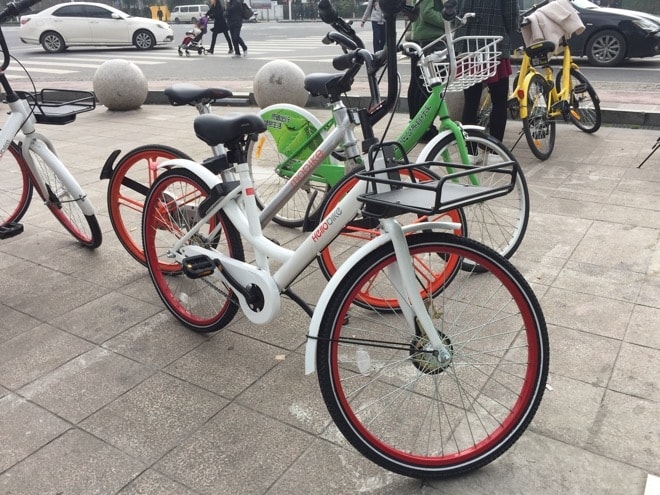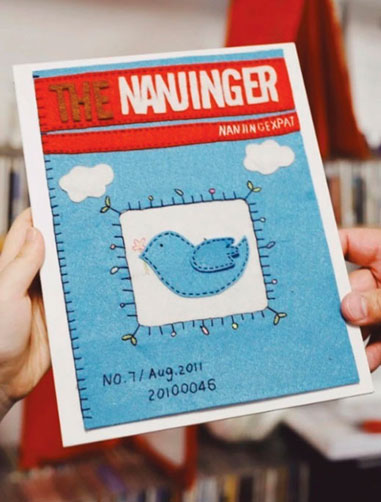There are many new bikes to share. Perhaps you’ve seen them on the streets of Nanjing; bicycles of eye-catching silver, bright green, yellow or white.
They are called private shared bicycles, a new product of the shared economy. Combining locks and smart phone apps, they link the Internet with transportation, this new phenomenon solves “the last mile” problem for many a person. The shared bicycles’ boom also meets the demands to ease traffic congestion and addresses the problem of air pollution in cities.
In Nanjing, there are five kinds of shared bikes; Mobike (as well as its second generation Mobike Light), Ofo Bicycle, Hello Bike, Bluegogo and DingDing Bike.
Among the five companies, Ofo bicycle is the oldest, founded in 2014 and intended for university campuses in Beijing. With financing, it expanded to other cities and went off campus. In 2016, Mobike and other bike companies joined the ranks of shared bicycles.
Unlike the public bikes that appeared in 2013, shared bikes do not use cards or fixed docking point, while they can also be rented with a smart phone and nothing else, which is more convenient for a short trip by bike.
Apps
Only Mobike app has an English edition while a portion of the Ofo app is in English. Taking Mobike app as an example:
1. Download the app according to the instructions.
2. Register with your phone number.
3. Pay the refundable deposit by WeChat or Alipay. The deposit for Mobike is 299 yuan. Hello Bike and DingDing Bike are both 199 yuan. Ofo bicycle and Bluegogo are 99 yuan. 4. Identify yourself with a photo of your passport and selfie posing with your passport on the Mobike app.
When using apps, you will find Mobike, Ofo Bicycle and Bluegogo require you to provide identification. Hello Bike and DingDing Bike require only a phone number. Mobike customer service reported that authentication information could be reviewed in 2 to 7 working days, and that many foreigners had registered successfully.
For the other four apps, the image below can be of assistance.
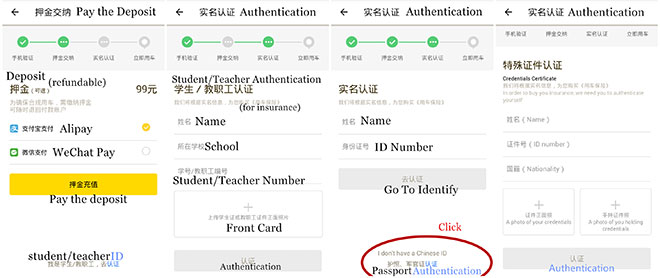
Registration process for private bike sharing app from Ofo Bike
Ride
When you open the app, you can see a map that shows all the available bikes nearby. Then make a reservation that lasts for up to 15 minutes. But Ofo bicycles are not equipped with GPS trackers. So there are no bikes shown on the map.
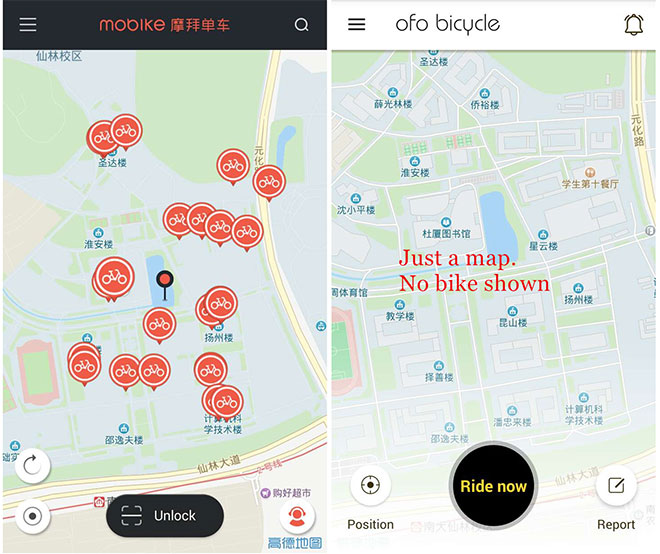
Private bike sharing app interface; Mobile (left), Ofo Bike (right)
Scan the QR code or enter the bike ID, and you can unlock the bike. Ofo bicycles have traditional locks, so you should input the bike number on your phone to gain the code, and unlock it by hand.
After riding, you should lock it by hand. The app system will finish counting charge automatically. The bike can be returned in the white bicycle parking lines on the sidewalk or bike parking coil. If there are no white lines, you can park it in a public location that doesn’t impact other means of transportation.
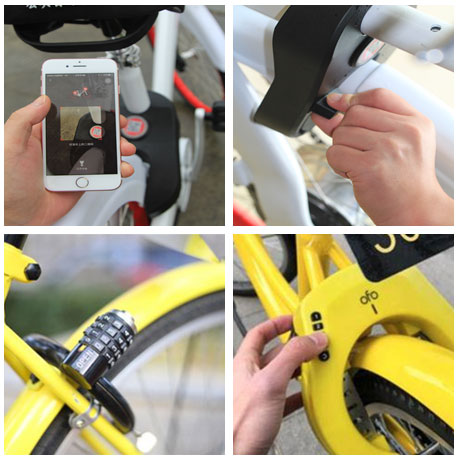
Different locking systems employed by private bike sharing companies
The Charging Process
Shared bikes will be charged by time. Ofo for students and teachers, Bluegogo, DingDing Bike and Mobike Light charge ¥0.5 per 30 minutes. The others charge ¥1 per 30 minutes.
Tender Loving Care
Because some customers have abused the system, the companies decided to use credit points. Each user is given 100 credit points after registration. Good behaviour includes reporting faults, and inviting friends to join. But parking in a compound, using a private lock, or forgetting to lock the bike can result in a loss of credit. When credit falls below 80, the charge soars to ¥100 per half hour.
Kong Qingshuang and three classmates came to Yangshan Park in Xianlin on a recent day. She and another girl rented Ofo bicycles. “It is very easy to pedal and picks up speed really well”, she said. Indeed, the Ofo bicycle is the lightest among the five. However, two boys rented Mobikes, the heaviest, weighing 25kg, as well as the most robust. The second generation Mobike Light weighs only 17kg.
Yan Yajing, a white collar worker living on Xueze Lu, came to the park as well. She used to go to work by bus. But now, she rides shared bikes almost everyday, Bluegogo and Mobike, for the 10-minute ride to the office. “I like their vivid colours,” the girl said. “They both have baskets, which I can put my handbag in.”
Yet, shared bikes also have problems. Sometimes Yan cannot not find the bike, even when the app shows its location. “Maybe someone parked the bike in a private garage,” she said. “The time I spent on looking for the bike was enough to get to the office.” For Huang Yue, a student in Nanjing Forest Police Academy, downloading three apps is somewhat troublesome, as they take up a lot of space on her phone.
Each company is trying their best to improve their bikes. A marketing department member of staff at DingDing Bike told The Nanjinger they were going to produce other coloured models, such as their new yellow product; “bumblebee”, and develop new functions that other bikes do not have, such as making a short-time reservation when you leave with the bike locked.
With a great deal of capital flowing into the bike-sharing market, there is fierce competition between the five companies. DingDing Bike, a Nanjing company, has launched about 14,000 bikes in the city and hopes for 100,000 more in 2017. Ofo said they would launch 20,000 bikes in Nanjing in 2017. Bluegogo’s plan is 50,000 and Mobike’s number is 100,000.
“Bike-sharing is a rare chance in some years,” as the CEO of Bluegogo, Li Gang, said in 2016. “Investing all my money, we choose to be all-in.”


